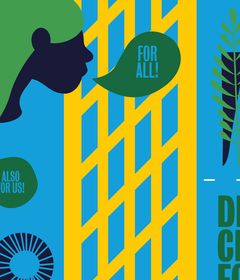In the new and final Designing Cities For All: RE-generation series City Games in the Age of Urban AI DCFA fellow Ekim Tan, director of Games For Cities and founder of Play The City , explores the role of city games in the era of artificial intelligence. This series aims to advance research by design, highlighting the need for engagement to achieve real impact. With Urban AI entering city practices, the series will examine how city games can enhance democratic practices and inspire spatial design within increasingly digitized communities. It seeks to explore the future of urban living, using the power of city games and AI to create more inclusive, connected, and future-proof cities.
The second episode of City Games in the Age of Urban AI series, Democracy, with DCFA Fellow Ekim Tan, examines how AI and city games can transform democratic processes. We are already witnessing an increase in the existing participation challenges. In this discussion , we will explore the different principles used for building algorithmic models , e.g. responsible AI . And power dynamics they create in decision-making processes and public engagement. How would AI and city games address social injustices and foster possible solutions for citizens?
About the DCFA Fellow
Ekim Tan is an architect from Istanbul based in Amsterdam. She obtained her doctoral degree at the Delft University of Technology with a focus on ‘ City gaming ‘, a method that refers to the specific implementation of serious games to city development questions. Later she published her book, Play the City: Games Informing Urban Development (2017) to provide a deeper understanding of our values, experiences, and intellectual attitude. In 2010, she founded Play the City , an Amsterdam and Istanbul-based city gaming practice that helps governments and market parties effectively collaborate with stakeholders. In 2016, Ekim co-founded Games for Cities , an umbrella organization of game[like] practices worldwide. Play the City leads the way in applying games to complex, multiplayer city challenges.
About the speakers
Maarten Sukel is a pioneer in responsible AI development, dedicated to creating technology that works for all in society. As a PhD researcher at the University of Amsterdam, he specializes in multimodal machine learning that integrates images, text, and data for practical applications. He is the author of “The AI Revolution” which explores the societal impacts of artificial intelligence. As the founder of The AI Factory , Maarten leads efforts in AI product development and strategic consulting, helping organizations to apply, scale, and manage AI in ways that are effective, responsible, and impactful.
Myrthe Blösser is an academic researcher at the University of Amsterdam, specializing in AI ethics and consumer psychology. In her research, she examines various tools to help citizens with low AI literacy protect themselves against unfair and discriminatory AI. She is also the co-founder of FemData , an organization dedicated to understanding how gender biases can distort model outcomes by influencing data collection, labeling, and interpretation, ultimately leading to skewed insights and perpetuating inequality. Through FemData, she organizes talks and workshops to bridge the gap between academia and industry and stimulate open discussions.
About Designing Cities for All: RE generation
Over the first two years of Designing Cities for All (DCFA), we’ve learned about exclusion by design and the (re)design of inclusive cities. Along the journey, a certain question kept popping up: what exactly does ‘for all’ entail? After focusing mostly on the ‘who’ over the past two years, DCFA is rebooting as Designing Cities for All: RE-generation . This way around, the series is also incorporating the ‘what’ by looking through the fresh lens of regenerative design. This emerging field might very well be a promising answer to the challenges of our time, as it focuses on the design of products, services, systems, and processes that lead to both social and ecological recovery and that keep the systems healthy.


The Dutch government risks exacerbating racial discrimination through the continued use of unregulated algorithms in the public sector, Amnesty International said in a damning new analysis of the country’s childcare benefit scandal.

Meet Robin, who went from ordinary Computer Science student to a trailblazer who turned AI bias into legal history in the Netherlands! She will take you on her – sometimes peculiar – journey to the Dutch Human Rights Institute, setting a precedent in the fight against discriminatory algorithms. Prepare to be shocked and awed as she reveals the alarming reality of bias in AI and the secrets to fighting back – no tech wizardry required! But above all, be ready to be inspired and empowered in the fight against the machines.









